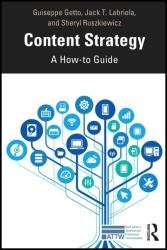Content Strategy: A How-to Guide
- Добавил: literator
- Дата: 13-10-2022, 19:40
- Комментариев: 0
 Название: Content Strategy: A How-to Guide
Название: Content Strategy: A How-to GuideАвтор: Guiseppe Getto, Jack T. Labriola, Sheryl Ruszkiewicz
Издательство: Routledge
Год: 2023
Страниц: 227
Язык: английский
Формат: pdf (true)
Размер: 10.1 MB
This comprehensive text provides a how-to guide for content strategy, enabling students and professionals to understand and master the skills needed to develop and manage technical content in a range of professional contexts.
The landscape of technical communication has been revolutionized by emerging technologies such as content management systems, open-source information architecture, and application programming interfaces that change the ways professionals create, edit, manage, and deliver content. This textbook helps students and professionals develop relevant skills for this changing marketplace. It takes readers through essential skills including audience analysis; content auditing; assembling content strategy plans; collaborating with other content developers; identifying appropriate channels of communication; and designing, delivering, and maintaining genres appropriate to those channels. It contains knowledge and best practices gleaned from decades of research and practice in content strategy and provides its audience with a thorough introductory text in this essential area.
Content strategy is a wide-ranging feld that encompasses everything from people who manage websites for a living to people who create repositories of content that companies can use for documentation. As organizations across industries, including technology, engineering, healthcare, and education, have grown, so have their needs for various types of content.
By “content” we mean useful information that an audience will consume. If you are a cook who keeps track of recipes in a private notebook, you probably don’t think of yourself as a content strategist. If you help a food manufacturing company to manage its public information across a variety of demographics and distribution channels, however, you might, in fact, be a content strategist.
People who manage content for a living are everywhere these days. Besides content strategists, they include:
Technical writers
Technical editors
Journalists
Freelance writers
Bloggers
Creative writers
Educators
Instructional designers
Researchers
Publishers
Website managers
Jobs like these have grown along with a global economy that involves processing more and more information. Many of us wake up to a smart device that serves as our alarm clock, personal digital assistant (PDA), and messaging system. We check updates on our laptop via social media platforms, company websites, online magazines, and news websites. We watch short videos, TV shows, and flms on our smart television via streaming websites like YouTube, Netfix, and Hulu. We shop for products ranging from food to furniture through e-commerce websites owned by both large and small companies. We even use the websites of national and regional non-profts to connect us to communities and individuals in need. And many of us also work to develop, manage, or distribute information to one or more audiences, whether we are a teacher, a communications manager for a non-proft, a documentation specialist within a software company, or even a lawyer.
All of these forms of information have to be managed within their specifc channels, defned as any means where content is distributed in order for it to be consumed by a specifc audience. The same piece of information can’t seamlessly fow through a blog displayed on a large desktop monitor, a notifcation on a small smart device, and a streaming video watched on a digital advertising display. Someone has to develop, format, edit, style, and deliver the content to each of those channels.
Content Strategy works as a core or supplemental textbook for undergraduate and graduate classes, as well as certification courses, in content strategy, content management, and technical communication. It also provides an accessible introduction for professionals looking to develop their skills and knowledge.
Table of Contents:
Introduction: What Is Content Strategy
Chapter 1: Key Concepts in Content Strategy
Chapter 2: The Content Strategy Process
Chapter 3: Audience Analysis
Chapter 4: Identifying Content Types and Channels
Chapter 5: Content Auditing
Chapter 6: Content Modeling
Chapter 7: Assembling a Content Strategy Plan
Chapter 8: Collaborating With Other Content Developers
Chapter 9: Revising and Editing Genres
Chapter 10: Ensuring Content Usability and Accessibility
Chapter 11: Delivering, Governing, and Maintaining Genres
Chapter 12: Localizing Content
Chapter 13: Content Tools and Technologies
Chapter 14: Establishing Yourself as a Content Strategist
Скачать Content Strategy A How-to Guide
[related-news] [/related-news]
Внимание
Уважаемый посетитель, Вы зашли на сайт как незарегистрированный пользователь.
Мы рекомендуем Вам зарегистрироваться либо войти на сайт под своим именем.
Уважаемый посетитель, Вы зашли на сайт как незарегистрированный пользователь.
Мы рекомендуем Вам зарегистрироваться либо войти на сайт под своим именем.
